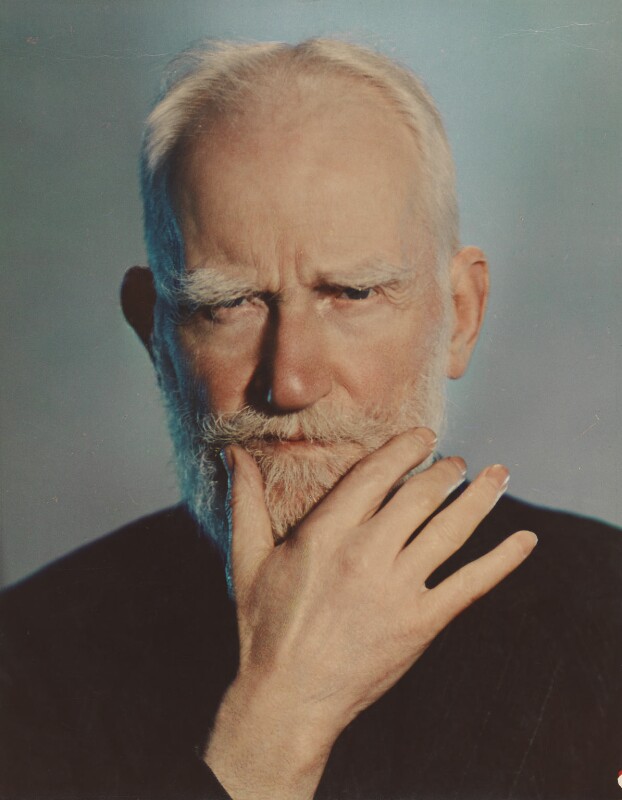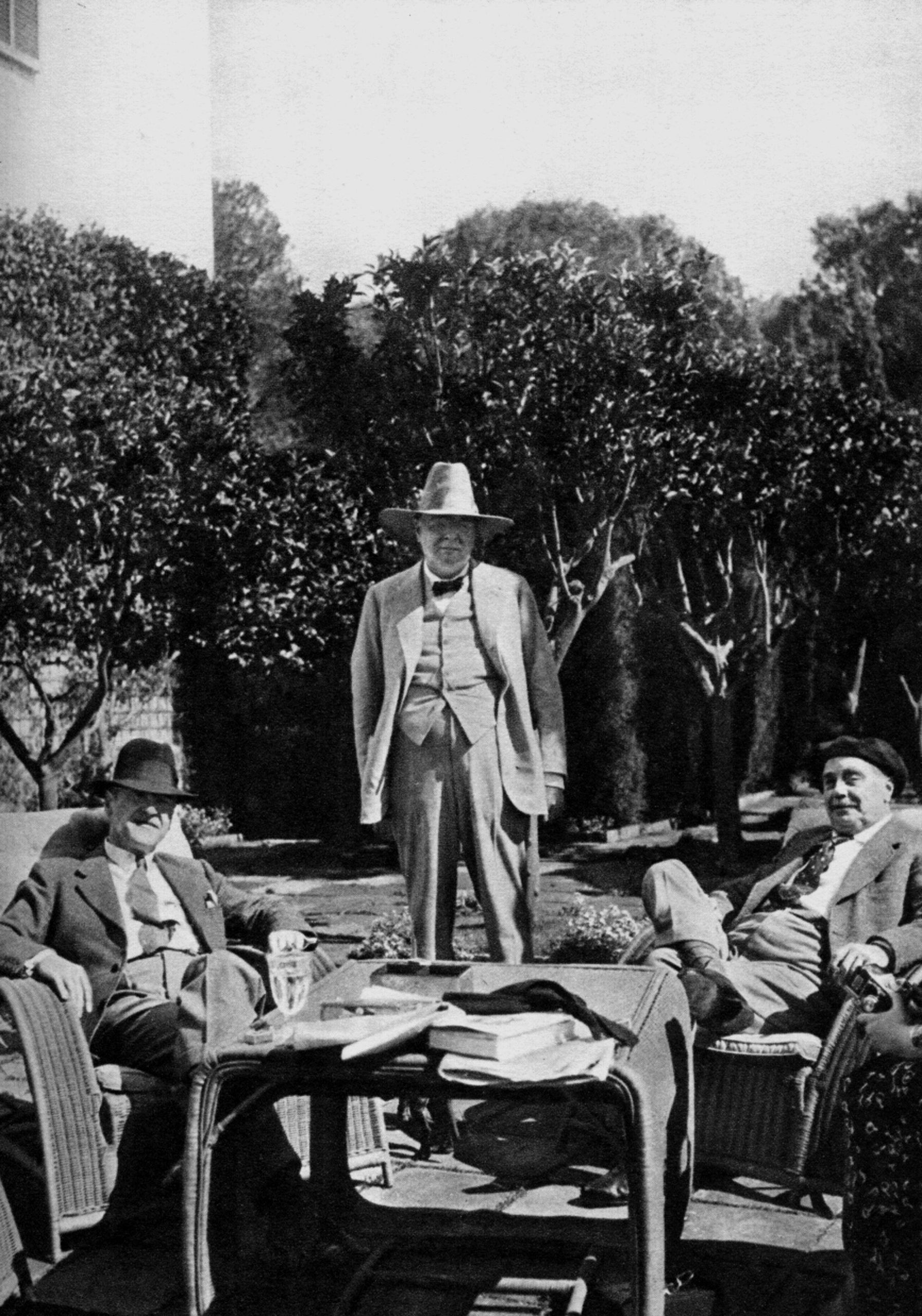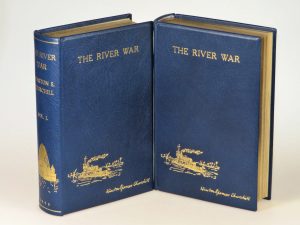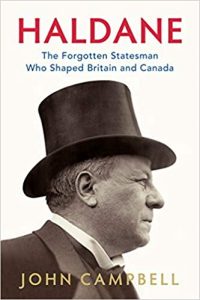Finest Hour 190
Shaw, Wells, and Maugham: Authors Churchill Knew

Geroge Bernard Shaw
April 20, 2021
Finest Hour 190, Fourth Quarter 2020
Page 32
Winston Churchill’s literary world included novelists, playwrights, poets, and writers of short stories. Three of his best-known friends, who were professional authors, were George Bernard Shaw, H. G. Wells, and W. Somerset Maugham. Churchill met and corresponded with each man over a long period of time. His friendships with Shaw and Wells had an edginess to them, since both men were professed socialists, and Churchill enjoyed satirizing their anything-but-socialist lives. With Maugham, however, a much warmer friendship developed.
GEORGE BERNARD SHAW
George Bernard Shaw (1856–1950), like Winston Churchill, received the Nobel Prize for Literature. The Irish playwright and British statesman had a long, friendly relationship characterized by political rivalry, which Churchill describes in Great Contemporaries. Here follow extracts.
Mr. Bernard Shaw was one of my earliest antipathies. Indeed, almost my first literary effusion, written when I was serving as a subaltern in India in 1897 (it never saw the light of day), was a ferocious onslaught upon him, and upon an article which he had written disparaging and deriding the British Army in some minor war.
Four or five years passed before I made his acquaintance. My mother, always in agreeable contact with artistic and dramatic circles, took me to luncheon with him. I was instantly attracted by the sparkle and gaiety of his conversation, and impressed by his eating only fruit and vegetables, and drinking only water. I rallied him on the latter habit, asking: “Do you really never drink any wine at all?” “I am hard enough to keep in order as it is,” he replied. Perhaps he had heard of my youthful prejudice against him.
In later years, and especially after the [First World] war, I can recall several pleasant and, to me, memorable talks on politics, particularly about Ireland and about Socialism….At any rate, I possess a lively image of this bright, nimble, fierce, and comprehending being, Jack Frost dancing bespangled in the sunshine, which I should be very sorry to lose.
Few people practise what they preach, and no one less so than Mr. Bernard Shaw. Few are more capable of having the best of everything both ways. His spiritual home is no doubt in [Soviet] Russia; his native land is the Irish Free State; but he lives in comfortable England. His dissolvent theories of life and society have been sturdily banished from his personal conduct and his home. No one has ever led a more respectable life or been a stronger seceder from his own subversive imagination. He derides the marriage vow and even at times the sentiment of love itself; yet no one is more happily or wisely married. He indulges in all the liberties of an irresponsible Chatterbox, babbling gloriously from dawn to dusk, and at the same time advocates the abolition of Parliamentary institutions and the setting up of an Iron Dictatorship, of which he would probably be the first victim.
He prattles agreeably with the tame English Socialists, and preens himself with evident satisfaction in the smiles alike of Stalin or Mussolini. He promulgates in stern decree that all incomes should be equalized and that anyone who has more than another is guilty—unconsciously perhaps—of personal meanness, if not fraud; he has always preached the ownership of all forms of wealth by the State; yet when the [1909] Lloyd George Budget imposed for the first time the slender beginnings of the Super-tax, no one made a louder squawk than this already wealthy Fabian. He is at once an acquisitive capitalist and a sincere Communist. He makes his characters talk blithely about killing men for the sake of an idea; but would take great trouble not to hurt a fly.1

H. G. WELLS
Herbert George Wells (1866–1946) and Winston Churchill first met in 1902. As with Shaw, Churchill had a long, friendly relationship with Wells characterized by political differences, which Churchill describes in the following extracts from a sketch first published in the Sunday Pictorial in 1931.
Mr. H. G. Wells nurses a grievance against the British Empire, the United Kingdom, and in particular against England. He cannot put this uncomfortable and querulous baby down; he has to carry it with him everywhere; he has had to carry it with him all his life. It must be a great nuisance to have such a brat on your hands and on your mind. Nowhere to put it, nowhere to leave it—no convenient Socialist crèche, no doorstep even! And then at the most unseasonable moments it lifts its voice. A dull, sour cry pierces a carefully-guarded silence, or worse still interrupts the flow of an agreeable and comprehending talker, or worst of all distracts a brilliant and—judged as a whole—unquestionably great English writer.
This grievance-baby was dumped upon him in very early life. He was but a stripling when he had to carry it. A draper’s apprentice! Ordered about hither and thither, made to get up too early, and sit up too late; dull routine under arrogant, petty taskmasters, meagre rewards, intense effort and self-denial, and all the irritations aroused in a proud and hampered spirit by gazing on the prosperous, substantial, well-established figures of the large world. These, or some of them, have been the ill-conditioned parents who passed this tiresome baby, deftly and almost imperceptibly, into Mr. Wells’s arms, and then vanished for ever.
After all—to leave the baby-metaphor on the shore—his grievance is not so great. Mr. Wells was born in humble circumstances into an island community where great statesmen had broken down the barriers of privilege and caste, and where wise laws enforced by vigorous Parliaments kept open the paths that offered careers to talent. Soon this wicked, purblind, common capitalist society offered to our young men the benefits not only of elementary, but of liberal and scientific education. From the treasured libraries which the past genius of its race had filled, he reached down pregnant and inspiring volumes. The peace of a soberly-guided and secure realm sheltered this youth from foreign tyranny. He found, as soon as he had power to think, that he had the right to express his thoughts to as many as cared to listen. He found without inheritance or favour the freedom to choose or change half-a-dozen occupations. He moved with ease to the true development of his native gifts. The base capitalists did not trouble about his indiscretions. They let him have his fling with mind and body. When his opinions were seen to be challenging and subversive, they did not attempt to silence him or punish him. On the contrary they pricked up their ears and began to listen. They turned their eyes upon Mr. Wells. They did more. They put their hands in their pockets and produced good money, offered him a chair and poured it into his lap.
The young H. G. Wells struck the brazen front of bad old Eng-land as Moses smote the rock with his rod, and there gushed forth an abundant golden stream. But these material benefits were but the beginning of his satisfactions. Hard upon them came appreciation, praise, cheers and fame. In a few years, while still a young man, the bright fruits of his intellect were everywhere accepted, welcomed, purchased and enjoyed. Everyone said “Hurrah! Here is a brilliant new writer. Here is an original mind. What do we care what his politics may be? Let us hasten to treat him with honour and respect.” Still there was this wretched baby or its ghost. Still it mewled and puked. Why could he not have left it on that tide-swept shore where we deposited our metaphor a few paragraphs ago?
But let us leave this painful (but we hope salutary) criticism of Wells the Fabian, Wells the Internationalist, Wells the milk-and-water little-Englander, Wells the melter-down of the hard-built structures of British greatness, and turn to the gifted being to whose gay and daring fancy and to whose penetrating vision so many of us owe so much. I am a great reader of Wells. It must be more than thirty years ago that I first discovered his “Select Conversations with An Uncle” or read in the pages of the “Strand Magazine” his “Queer Side of Things.” I responded at once to his intellectual stimulus and literary dexterity; and when I came upon “The Time Machine,” that marvellous philosophical romance, not unworthy to follow at some distance, but nevertheless in the train of “Gulliver’s Travels,” I shouted with joy. Then I read all his books. I have read them all over since. I could pass an examination in them. One whole long shelf in my small library is filled with a complete edition. I could point out with a blue pencil the passages where the brat has squalled. But never mind them. Here is entertainment and frolic. Here are suggestions of order and design. Here are shrewd ideas of peace and war. Here are prophecies of the future, not a few of which we have lived to verify and endure.2
SOMERSET MAUGHAM
“I once said to Winston Churchill,” Somerset Maugham wrote broadcaster Kenneth Allsop, “‘If I had not stammered I might have gone into politics and with my knack for speaking languages, I might have become our foreign minister.’ He looked at me and grunted. So I became a writer.”3
William Somerset Maugham and Winston Spencer Churchill were born in the same year (1874), and they died in the same year (1965). They first met before the Great War, when Churchill was a dynamic young Cabinet minister and Maugham was best known as a successful young playwright. Maugham found Churchill to be refreshingly unlike other politicians, and Churchill admired Maugham’s urbanity and wit. This led to an arrangement:
“I want to make a compact with you,” Churchill told Maugham. “If you will promise never to be funny at my expense, I will promise never to be funny at yours.”
“You’re joking,” Maugham said.
“I’m quite serious,” Churchill said. “I want you to promise me that.”
Maugham made the promise, and the two men became lifelong friends. Since Maugham had been born first, by ten months, Churchill was fond of saying to him, “I’m sure you’re right, you’re so much older than me.”4
In his later years, Maugham deliberately destroyed much of his correspondence, including letters he had received from Churchill. Nevertheless, there remains a record of occasional contact between the two men. Maugham, for example, performed intelligence work in Russia during the First World War and afterwards wrote a series of short stories based on the experience. He then proceeded to destroy several of them after Churchill told him they violated the Official Secrets Act. After Edward Marsh, who had long served Churchill as a private secretary in government, told Maugham that he was reading proofs of Churchill’s History of the English-Speaking Peoples, Marsh offered to perform the same task for Maugham, leading to a long collaboration.
Maugham’s elder brother Frederick was, briefly, Lord Chancellor under Neville Chamberlain and ipso facto a supporter of appeasement. The younger Maugham, however, had been living in the south of France since 1926 and had strong doubts about the French as reliable allies. When he shared these views with his brother, he was patronizingly dismissed with the reassurance that “there will be no war.”5
After spending most of the Second World War in the United States, Maugham returned to his house in France. Churchill, on his frequent visits to the Riviera, would meet Maugham for luncheon. After he became Prime Minister for the second time, Churchill had a hand in having his old friend created a Companion of Honour.
When in 1954 it was announced that Parliament would commission a portrait of Churchill by Graham Sutherland in honor of Churchill’s eightieth birthday, Clementine Churchill attempted to persuade her husband not to sit for Sutherland. She showed Churchill photographs of portraits the artist had done of Maugham and Lord Beaverbrook. “My God, it’s the living image of Willie,” Churchill exclaimed, “And I must say, that certainly is Beaverbrook, the old scoundrel.” The resulting portrait of Churchill, however, became infamous. “I don’t like it,” he told Maugham.6
Two years later and in retirement, Churchill wrote Clementine from the south of France about a rest cure Maugham had recommended at “a watering place just north of Venice.” “The cure takes 12 days & it might be worth trying,” he concluded.7 As it turned out, however, alcohol and tobacco were not permitted, and no more was heard from Churchill about taking the cure.
Despite the long friendship, it appears that Churchill did not start reading Maugham’s own writings until quite late in life, but the wait had been worth it. “I have been reading the short stories of W. Somerset Maugham,” Churchill wrote Clementine in 1957, again from the Riviera. “They are quite good, & have so far interested me that I am nearly late for lunch & dinner every day.”8 Punctuality had never been a Churchillian characteristic, of course, but he did enjoy an absorbing book.
Endnotes
1. Winston S. Churchill, Great Contemporaries (Wilmington, DE: ISI Books, 2012), pp. 47–60
(cf. pp. 430–31); excerpts quoted are at pp. 47–48, 53–54.
2. Ibid., pp. 373–78 (cf. pp. 485–86); excerpts quoted are at pp. 373–74, 376–77. The article, originally published as Winston S. Churchill, “H. G. Wells: Who Nurses a Grievance but for Which He Might Be of Great Help to Britain,” Sunday Pictorial 858 (23 August 1931), pp. 8, 25, was not included in Great Contemporaries by Churchill but added as a supplementary essay in this recent edition.
3. Ted Morgan, Maugham: A Biography (New York: Simon
and Schuster, 1980), p. 612.
4. Ibid., p. 152.
5. Ibid., p. 425.
6. Ibid., pp. 566–67.
7. Martin Gilbert and Larry P. Arnn, eds., The Churchill Documents, Volume XXIII, Never Flinch, Never Weary: November 1951 to February 1965 (Hillsdale, MI: Hillsdale College Press, 2019),
p. 2094.
8. Ibid., p. 2161.
Subscribe
WANT MORE?
Get the Churchill Bulletin delivered to your inbox once a month.






